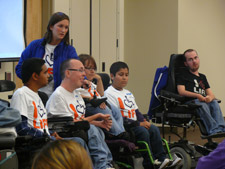Beckwith Students Raise Disability Awareness

Stevie Hopkins (far right), founder of 3E Love, and Beckwith Program participants raised awareness about disability.
"If you're interested in disability, [the University of Illinois] is the place to be. You have the opportunity
here to join a unique culture in the disabled world, and you’re never going to have it again."
Stevie Hopkins, former Beckwith Program participant and co-founder of 3E Love
In observance of Disability Awareness Month in October, the Division of Disability Resources and Educational
Services, the Beckwith Program, and University Housing co-sponsored a panel discussion featuring former and current
Beckwith residents. About 200 students attended the event, which was held on October 20th in the multipurpose room
of Nugent Hall.
As a student with type II spinal muscular atrophy, Stevie Hopkins, who graduated with a dual bachelor's degree
in finance and business administration in 2006, lived in Beckwith Hall. He recalled the difficulty of his first
year at the University of Illinois, and the empowerment that came with becoming more comfortable with himself in
his junior and senior years. "Living with other people with disabilities was very important in that process," he
said. He was joined at Illinois by his younger sister Annie, who also had spinal muscular atrophy. As the more
outgoing sibling, she brought fun to every situation. "Once we started having fun," Hopkins said, "people without
disabilities started hanging around more, and the Beckwith community got larger and larger."
Stevie and Annie Hopkins co-founded 3E Love, a disability awareness clothing line and marketing company. Its
signature symbol was designed by Annie, who died in 2009 after developing a post-surgical infection. Hopkins said
he would never forget her telling him in the hospital, "They treat me like a child," adding that it fuels his
desire to change perceptions of disability. His eventual goal is to see disability education curricula in every
K-12 school.
Hopkins and a group of current Beckwith Program participants took questions from the audience. The lively
and frank discussion—which addressed everything from the emotional and physical toll of acquiring a disability
later in life to the cost of wheelchairs to the sex lives of people with physical disabilities—kept the audience
riveted for more than two hours.